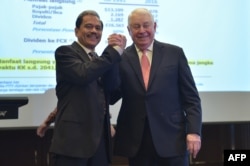The American mining company Freeport-McMoRan has brought the world's biggest gold mine, in the Indonesian province of West Papua, to a standstill. The corporation is butting heads with the Indonesian government over protectionist mining regulations. And now that Freeport has started to dismiss tens of thousands of workers, the local economy is poised to take a huge hit. In Mimika Regency, the West Papua province containing the Grasberg gold mine, 91 percent of the Gross Domestic Product (GDP) is attributed to Freeport.
Freeport Indonesia abruptly stopped production on February 10 and laid off 10 percent of its foreign workers. It employs 32,000 people in Indonesia, about 12,000 of whom are full-time employees. The freeze was a reaction to a shakeup in Freeport’s 30-year contract with the Indonesian government, signed in 1991. Indonesia has tried to levy additional obligations from Freeport in an attempt to increase domestic revenue from its natural resources. Freeport retaliated last week by threatening to pursue arbitration and sue the government for damages.
The Indonesian Ministry of Energy and Mineral Resources could not be reached for comment on the issue.
Observers on the ground in Papua and from afar in Jakarta worry the shakeup will decimate the local economy and lead to violence in the historically unstable region. West Papua has long been a troubled territory in Indonesia and its independence movement has long been met with brutal military action.
Activist concerns
“I don’t think the government comprehended the social impact of the Freeport freeze in Mimika,” said Octovianus Danunan, editor of the Radar Timika, a local newspaper. “Freeport runs two hospitals here, gives hundreds of scholarships to local students, and of course, provides jobs to thousands of Papuans. With these layoffs, people are extremely worried; their lines of credit are vanishing as we speak.”
“These layoffs have eliminated the livelihoods of a lot of people,” said John Gobai, a member of the Papua parliament. “We have heard from indigenous people here in Timika [the site of Freeport facilities] that people are becoming sick from stress. They are falling into an abyss of stress.”
According to an internal Freeport report from 2015, about 36 percent of its full-time employees are native Papuans.
“I suspect that, because they may lose their jobs, many employees will want to stage demonstrations… but then, ironically, they will be laid off because that’s the state policy. I think this whole situation is a human rights violation,” said Gobai.
“Violence is a very big possibility,” said Andreas Harsono, a Human Rights Watch researcher. “Timika is the wild, wild east of West Papua. It's the location of more than 3,500 security officers stationed along the 90-mile mining road, not to say Papuan guerrillas and hundreds of military deserters, all looking for a slice of the gold and copper mine. Shooting along the road is a regularity rather than an irregularity. I cannot imagine the situation if Freeport goes ahead with dismissing all 30,000 mining workers there.”
Gobai said there have already been some protests on Freeport headquarters and he expects there will be more going forward.
Freeport’s CEO Richard Adkerson told Reuters that the company was committed to staying in Indonesia, not least because about one-third of West Papua’s economy comes from the Grasberg mine.
Freeport’s history in Indonesia
On February 12, Adkerson issued a hard 120-day ultimatum to the Indonesian government to back down on its new demands or else face arbitration from the mining giant.
Freeport’s involvement in Indonesia dates back to the Suharto military dictatorship, which signed over 250,000 acres of West Papuan territory in 1967.
Freeport was the first foreign company to sign a contract with the new Indonesian government and, due in part to this history, it is now the single largest employer in all of Indonesia.
The company enjoyed a complicated special relationship as a “quasi-state organization for Jakarta,” as Inside Indonesia details, throughout the Suharto era, but the relationship has cooled under subsequent, democratically elected presidents.
The friction that led to this month’s impasse is a 2009 mining law that would require Freeport to build a $2.9 billion smelter (in order to move resource exports higher up in the value chain from just raw materials) and divest the majority of its shares to Indonesian ownership within 10 years.
Freeport maintains that, since its current contract runs through 2021, it doesn’t need to act on the regulations yet. But Indonesian officials, led by Mines and Energy Minister Ignasius Jonan, have ramped up pressure for Freeport to convert its contract per the 2009 law to a “Special Business License,” which precipitated today’s standoff.
Situation in flux
Both Indonesia and Freeport are likely to see monetary losses from the clash, but Indonesia seems committed to asserting its terms for collaboration. The global commodities market for ore and other natural resources has also dipped in the last year, with a particular slowdown from China.
The ground situation is likely to be in constant flux over the coming months as the Indonesian government gears up for a fight. On Monday, the government announced it is grooming a state-owned aluminum enterprise to take over the Grasberg mine if it wins arbitration with Freeport.
“What the government really needs to think about is what compensation they can give to layoff victims in the present,” said Gobai. “These people are employees, but they are also citizens.”





